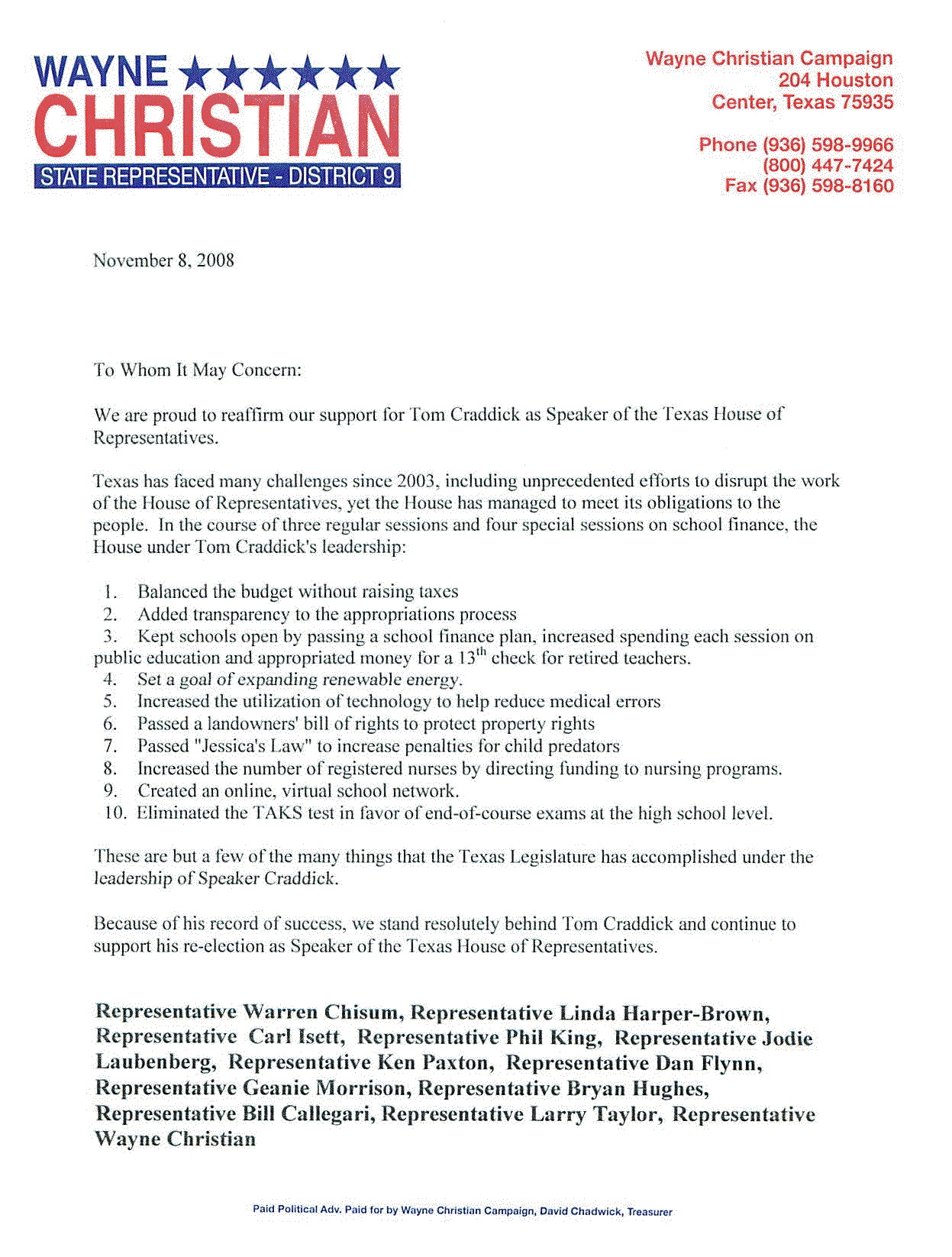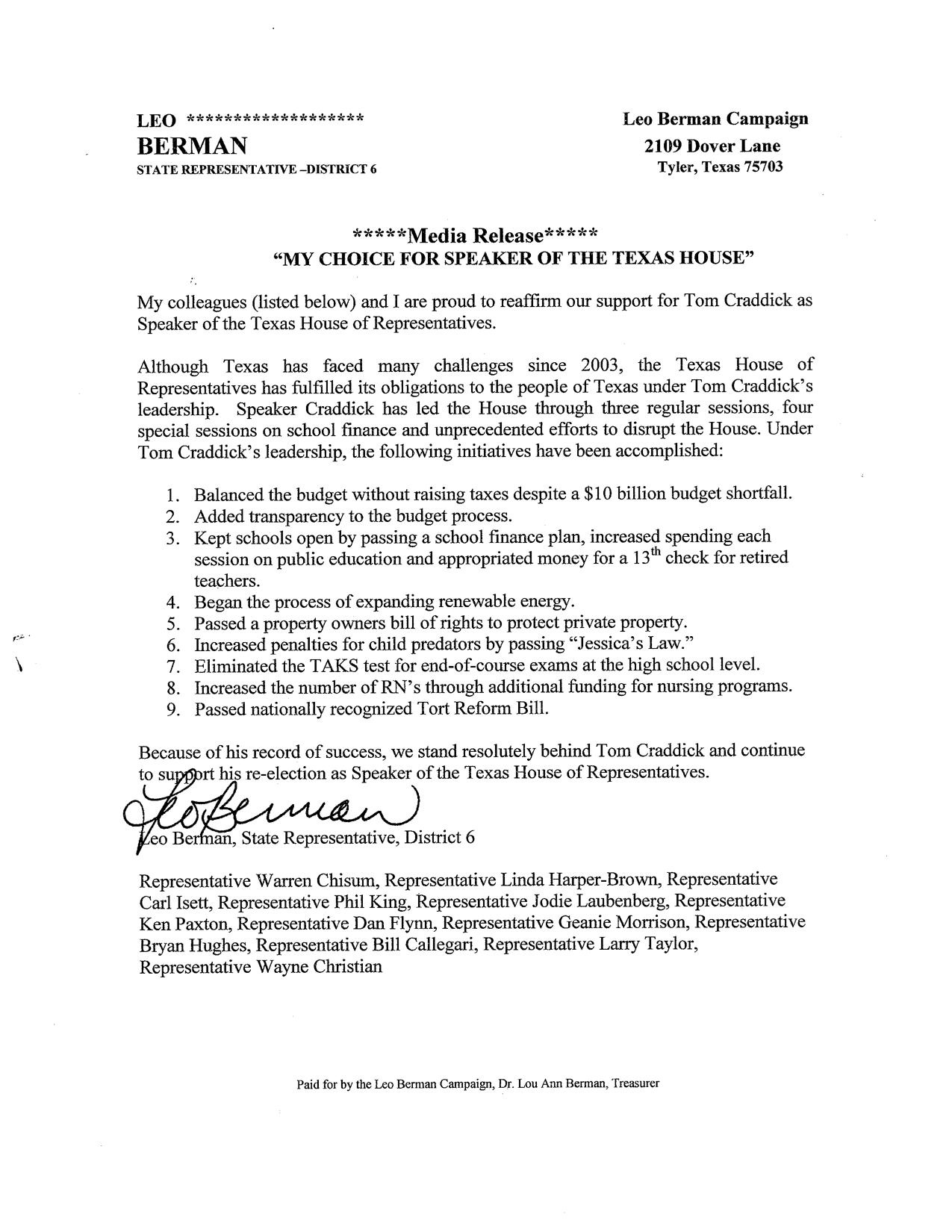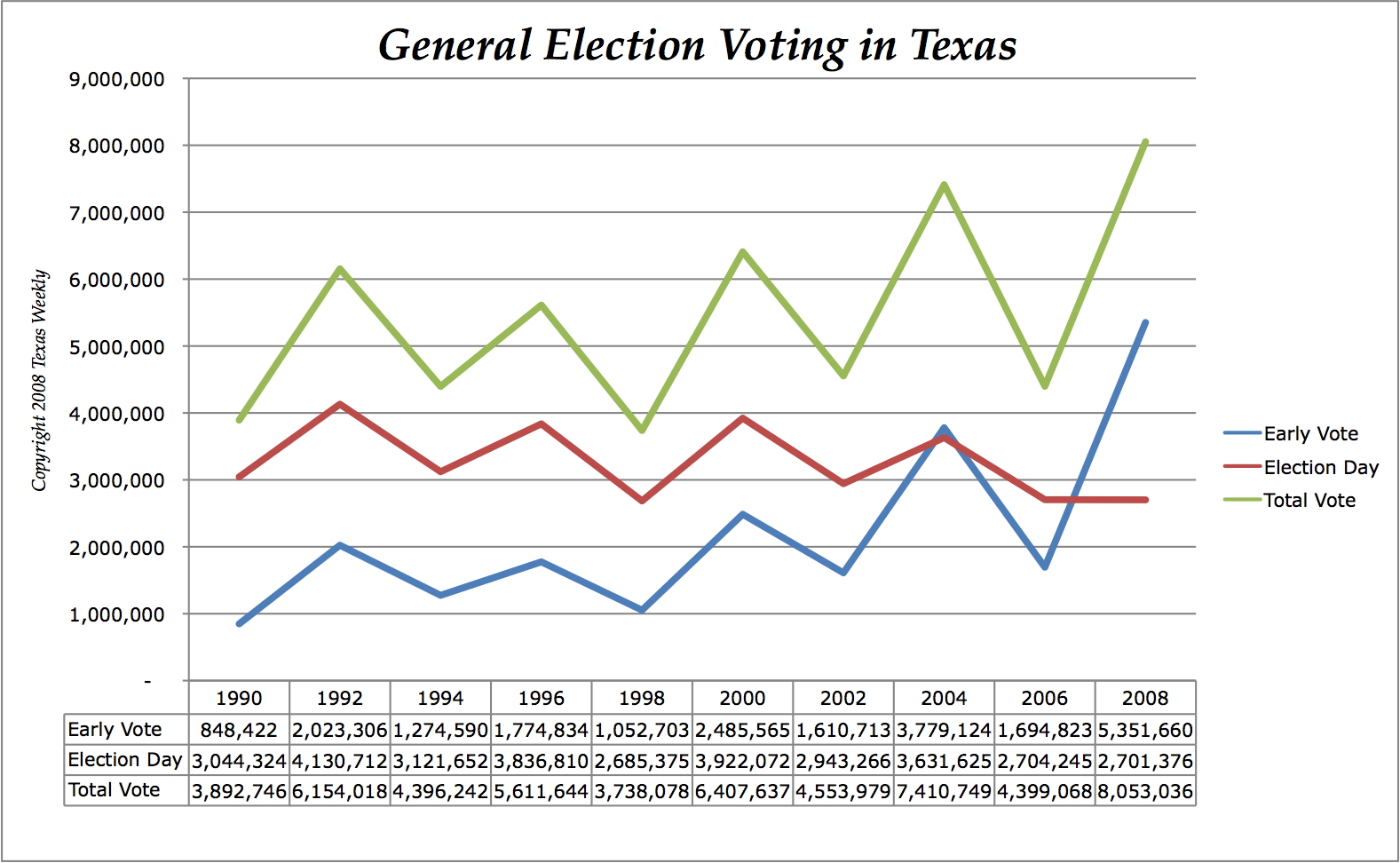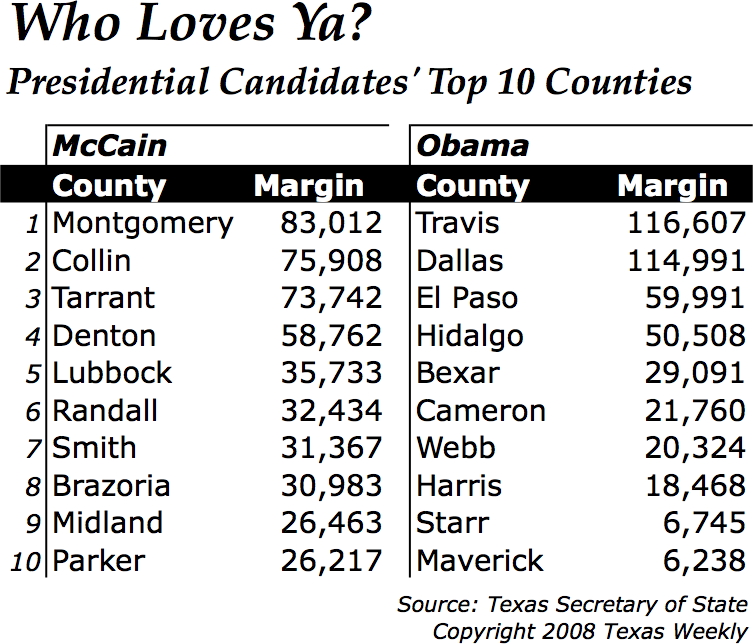The election's over, but the latest battle for the House Speakership is just heating up in the blogosphere as in real life. Bloggers are also talking about the folks who won on November 4, and the ones who didn't. There are even some nonpartisan looks at voting results.
* * * * *
Eakersp-ay Hearsay
Setting the scene for the conflict, the Dallas Morning News's Trail Blazers posts a video by the Associated Press's Jay Root about House Speaker Tom Craddick's "stand" to maintain his position at the end of the 2007 Lege session.
"Presently, prevailing wisdom here at the capitol is that if Republicans retained control of the House even by one seat, Craddick would win a fourth two-year term as speaker," says Rep. Aaron Peña, D-Edinburg, in his A Capitol Blog. But Postcards from the Lege, the Austin American-Statesman's blog, writes why Craddick might be better off with a 75-75 tie than with a one-Republican majority.
By Capitol Annex's count, there's a good chance Craddick has 77 votes. He handicaps some Speaker candidates here. According to Blue Dot Blues, "the buzz is deafening that Democrats will back Rep. Pete Gallego (Alpine) for speaker." And Eye on Williamson thinks Rep. Dan Gattis, R-Georgetown, seems an "unlikely" Speaker choice "because of his relative youth."
Hoping that Texas House Democrats will stay united to dethrone Craddick, Burnt Orange Report swears off using the term "Craddick D" ever again. "The Ds didn't get enough done on Nov. 4th," muse says.
BurkaBlog says Craddick deserves credit for one of three seats the Republicans picked up, and deserves blame for the six they lost. He also outlines how the Democrats are making sure they'll lose again this time.
* * * * *
Olive Wreaths
Pres. Barack Obama? Who woulda thunk it? Molly Ivins, apparently, says Texas Observer Blog, with photo evidence. Meanwhile, Trail Blazers was present for the Obama victory party at Grant Park in Chicago. And A Capitol Blog receives an invitation for the January inauguration in Washington, D.C.
KVUE's Political Junkie live-blogged from the Democrats' victory party in Austin at the Driskill Hotel here, here, here and here. Newsdesk, the Austin Chronicle's blog, was there, too. And so was In the Pink Texas.
Noting that every statewide Dem lost, Texas Cloverleaf expresses doubts about the efficacy of Obama's coattails in Texas. Obama performed worse than John Kerry in 100 Texas counties, says Annex. [eds. note: The New York Times has a neat map online that compares this election, by county, to any presidential race back to 1992. Click on Texas to enlarge it, and play away.]
"Democrat resurgence?" Not in Williamson County, says Williamson Republic, despite the victory of Democrat Diana Maldonado over Republican Bryan Daniel. Eye on Williamson has analysis. Meanwhile, A trainwreck in Maxwell is happy that Medina County went 100 percent Republican, "considering it is on the tan side." [eds. note: Medina County's population is 45.5 percent Hispanic and 2.2 percent African American, according to the Census Bureau.]
Steve Walker of Walker Report was elected Justice of the Peace in San Antonio, while Junkie talks to Trail Blazer Wayne Slater about Texans who could join Obama's administration.
Arguably the biggest winners on Election Day are the five folks who tied for the title of "Biggest Baddest Politically Savvy Mo-Fos in Texas," via Letters From Texas. And here's how the Trail Blazers fared with their presidential predictions.
* * * * *
Sour Grapes
Policy Spotlight gives credit to Democratic leadership and reflects on the state of the Republican Party. The Travis Monitor has a 10-point strategy for victory, while Red Ink: Texas has six things the GOP needs to do in the next two years.
Before the election, PatriotWriter vowed that she'd move to "Alaska. Or at least Houston" in case of an Obama victory. (We'll see...) "Good job you liberal jerk-offs," says 123beta.
"It could have been much, much worse!" says Lone Star Times, who live-blogged the election for KHOU-TV. Follow this link for reader reactions to Obama's win. "Disappointed as I may be, I recognize the historical significance of this moment," says Texas Rainmaker, who was at the polls in Lake County, Indiana, on election night.
Judge for yourself if this post by Pondering Penguin comes off as a bit bitter. That's what the GOP gets for nominating a RINO who believes in global warming, among other things, says Texican Tattler.
UrbanGrounds live-blogs the election, then writes a congratulatory post to the Democrats that begins graciously and goes from there. Also kicking it at the Four Seasons for the Austin Republicans' election night party was yeah, right, whatever, who pledges not to "demonize" Obama the way Democrats did George W. Bush.
Rhymes with Right isn't happy that Obama's the President-Elect, but is proud of America anyway. Plowing, Sowing, and an Occasional Harvest finds solace in the Bible. And A Keyboard and a .45 wonders how Obama garnered the Hispanic vote.
Here's the complete text of Democratic U.S. Senate candidate Rick Noriega's concession statement, from Texas on the Potomac, the Houston Chronicle's blog. PoliTex, the Fort Worth Star-Telegram's blog, has a concession email from Sen. Kim Brimer, R-Fort Worth, who was ousted by Wendy Davis. And Texas Kaos has a concession post from Charles Randolph, who lost to Rep. Phil King, R-Weatherford.
BeldarBlog prays for Obama to correct his flaws. North Texas Conservative has a very long post filled with after-election thoughts. Meanwhile, Big White Hat finds victory in defeat. And Discerning Texan wins Headline of the Week award for an entry on post-election blogging plans for conservatives, titled, "Time for a Vacation."
* * * * *
So That's What Happened
Off the Kuff analyzes the 2004 and 2008 turnouts of mostly Hispanic and Black state rep. districts in Houston. And Mike Falick's Blog links to a site with historical results of presidential elections.
Here's the "Criminal Justice Implications of 2008 Elections" from Grits for Breakfast. And the Houston Chronicle consolidated all of its bloggers' election-related posts into one Election 2008 blog. Check it out here.
* * * * *
Misc.
Local bloggers provide PoliTex with some of their favorite posts from the election season. And Rhetoric & Rhythm posts the Doonesbury strip the San Antonio Express-News wouldn't run.
Here's an interesting post from Rick Perry vs. The World: "Interpret this for me. Lots of google hits on this page over the past few days for some variation of 'rick perry term limits.'" (The blog is back, he says, because it "might actually happen this time.")
It's curtains for muckraker, who posts for the final time after picking up and moving to southern Illinois. And Friends of Justice is passing the hat around in order to stay afloat.
This edition of Out There was compiled and written by Patrick Brendel, who hails from Victoria but is semi-settled in Austin. We cherry-pick the state's political blogs each week, looking for news, info, gossip, and new jokes. The opinions here belong (mostly) to the bloggers, and we're including their links so you can hunt them down if you wish. Our blogroll — the list of Texas blogs we watch — is on our links page, and if you know of a Texas political blog that ought to be on it, just shoot us a note. Please send comments, suggestions, gripes or retorts to Texas Weekly editor Ross Ramsey.





